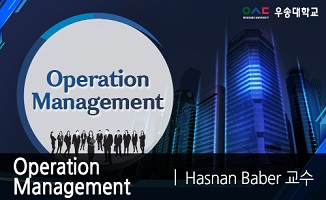수업내용/목표
The purpose of this lecture is to learn operation management based on facility location strategy, supply chain management, inventory management, and quality control by comparing them to real life so that they can be understood by learners.

1. 강의 계획서
|
주차 |
학습목표 및 주요내용 |
학습요소 |
|
|
차시 |
Introduction to Operations Management |
||
|
1 |
1 |
1-1. Intro & Different between goods and services → Introduction to operations management → Distinguish between goods and services, production and productivity → Identify the critical variables in enhancing productivity |
강의영상 1개 퀴즈 1개 |
|
2 |
1-2. Projects → Scheduling and managing project → AOA and AON network → Determine a critical path → Calculating the variance of activity times |
강의영상 1개 퀴즈 1개 |
|
|
3 |
1-3. Forecasting → Knowing which forecasting approaches and techniques → Quantitative and qualitative techniques → Understanding trend projections |
강의영상 1개 퀴즈 1개 과제 1개 |
|
|
2 |
Plan Layout |
||
|
1 |
2-1. Facility Location strategy → Identifying and explain major factors that affect location → Understanding different methods of choosing location |
강의영상 1개 퀴즈 1개 |
|
|
2 |
2-2. Principle & Types of plan layout → Defining objectives and principles of facility layout → Understanding different types of layouts → Explaining advantages and disadvantages of different layout |
강의영상 1개 퀴즈 1개 |
|
|
3 |
2-3. Retail layout → Retail layout in reality → Shelf Space → Placing of items |
강의영상 1개 퀴즈 1개 토론 1개 |
|
|
3 |
Supply Chain Management |
||
|
1 |
3-1. Introduction to Supply Chain Management → Explaining the strategic importance of the supply chain |
강의영상 1개 퀴즈 1개 |
|
|
2 |
3-2. Make or buy decisions and outsourcing → Identifying six sourcing strategies → Explaining issues and opportunities in the supply chain |
강의영상 1개 퀴즈 1개 |
|
|
3 |
3-3. Supply chain Views → Describing the views of supply chain → Explaining cost efficiency and responsiveness of supply chain |
강의영상 1개 퀴즈 1개 토론 1개 |
|
|
4 |
Inventory Management |
||
|
1 |
4-1. Introduction to Inventory Management → Understanding functions of inventory and types of inventory |
강의영상 1개 퀴즈 1개 |
|
|
2 |
4-2. ABC Analysis model → Conducting an ABC analysis → Explaining and use cycle counting |
강의영상 1개 퀴즈 1개 |
|
|
3 |
4-3. Economic order quantity model → Explaining and using the EOQ model for inventory demand → Computing and reorder point and explain safety stock → Understanding quantity discounts |
강의영상 1개 퀴즈 1개 과제 1개 |
|
|
5 |
Inventory Management |
||
|
1 |
5-1. Introduction to Total Quality Management → Defining quality and TQM |
강의영상 1개 퀴즈 1개 |
|
|
2 |
5-2. Tool of TQM and Six sigma → Explaining how benchmarking is used in TQM and quality robust and Taguchi cocepts → Using the seven tools of TQM → Explaining Six Sigma |
강의영상 1개 퀴즈 1개 |
|
|
3 |
5-3. Statistical Process Control → Explaining the purpose of a control chart → Understanding quantity discounts |
강의영상 1개 퀴즈 1개 토론 1개 |
|


| 과제명 | 퀴즈 | 토론 | 과제 | 기말고사 |
|---|---|---|---|---|
| 반영비율 | 20% | 20% | 20% | 40% |
※ 총 60% 이상 점수 획득 시, 이수증을 발급받을 수 있습니다.
전공기초 수준이며, 선수요건 없음.
Principles of Operations Management : Sustainability and Supply Chain Management, 10th Golbal Edition (Jay Heizer, Barry Render)
아니오, 없습니다.